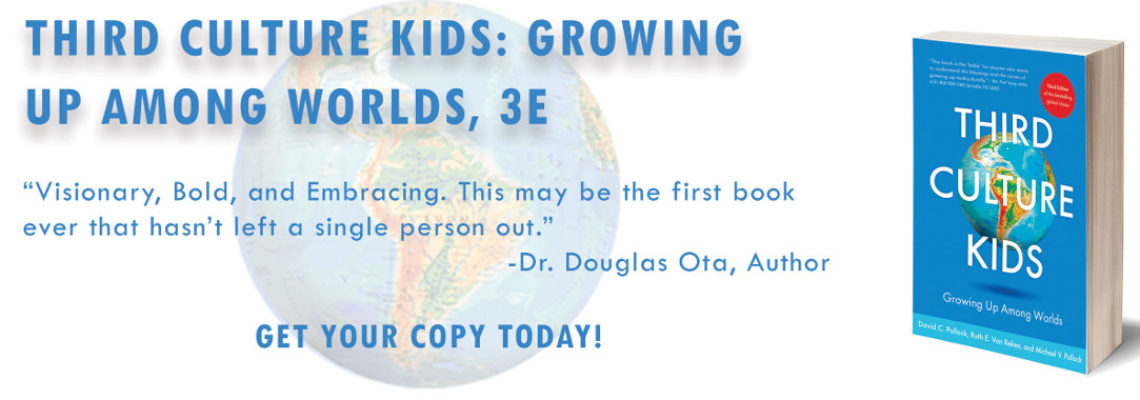Third Culture Kids Excerpts
Third Culture Kids Excerpts
| Third Culture Kids : Growing Up Among Worlds | |
| David C. Pollock and Ruth E. Van Reken | |
|
|
| Pollock and Van Reken have done a compelling job…. [They] present a balanced perspective of the benefits as well as the challenges inherent in being raised as a TCK.
-Paul E. Nelson |
What happens to children when they are raised outside their parents’ home country?
In Third Culture Kids: Growing Up Among Worlds, David Pollock and Ruth Van Reken explore systematically and compassionately the experiences of those who have become known as third culture kids (TCKs) – children who grow up or spend a significant part of their childhood living outside their parent(s)’ passport or home culture. Rich with real-life anecdotes from TCKs, this is one of the first books to fully examine the nature of the TCK experience and its effect on maturing, developing a sense of identity, and adjusting to one’s passport country upon return.
The authors begin by defining TCKs and describing the nature of the cross-cultural experience that has helped to shape these children’s live. Pollock and Van Reken then move on to the TCK Profile personal characteristics, practical skills, the experience of rootlessness and restlessness, personal relationships, developmental issues and unresolved grief and include a thorough discussion of the benefits and challenges of the TCK life. When they updated their book in 2009, they added a chapter to begin the discussion of how many of these findings may or may not also reflect the experiences of other types of cross-cultural kids (CCKs) – children who have grown up among many cultural worlds for a wide variety of reasons. Is it possible we have missed the cross-cultural negotiating skill sets children who belong to a minority cultural community have developed as they move between majority and minority culture on a daily basis as part of their process of attending schools? Have we overlooked the fact that not only are refugees dealing with physical trauma, but the loss of entire world in ways that feel emotionally familiar to TCKs who took airplane rides from countries they loved? Can we begin to enlarge our discussions between the many groups and families who are now raising children in this ‘new normal’ of cultural complexity? Each chapter of the new edition ends with a section called ‘Lessons from the TCK Petri Dish’ in which some of these questions of similarity and/or difference between experiences are explored.
In the second section, Pollock and Van Reken offer suggestions for what TCKs, other types of CCKs, their parents, and sponsoring organizations can do to maximize the benefits of the TCK/CCK experience to help the TCK/CCK build a strong personal foundation, deal effectively with transition, meet educational needs and, ultimately, deal with the challenges of repatriating permanently or even, for immigrant children, going back to visit relatives in a country where others will assume they are alike but, because of their growing up in another culture, these children also will have changed from what others expect them to be.
Third Culture Kids concludes with two appendices that shed further light on the lives and experiences of TCKs. The first presents the results of a survey conducted by Ruth Van Reken on how adult TCKs’ lives were affected by their experiences. The second appendix includes an article my Momo Kano Podolsky, comparing her research among Japanese TCKs with the work of US based researchers.
While this book looks in depth at the specific experience of those who are traditional TCKs and adult TCKs – individuals who accompanied their parents into another culture due to the parent’s career choice – others with a cross-cultural upbringing of any kind and their parents, relatives and friends of TCKs and other CCKs will find this an invaluable resource. For many TCKs and other CCKs, this book will be their first opportunity to discover that they share a common heritage with countless others around the world. In addition, the organizations/corporations that send families overseas will benefit by knowing how to better support their families. And teachers in every country around the globe who are now facing the increasing internationalization of their student populations whether or not those teachers move themselves or simply stay in their local schools while the world comes to their doorsteps, would do well to read and understand the ‘new normal’ of students they teach everyday.

Before his death in 2004, David C. Pollock worked with TCKs and adult TCKs for more than twenty years and logged thousands of miles conducting seminars and conferences for TCKs, their parents, and sponsoring organizations.
 Coauthor Ruth Van Reken, herself an adult TCK and a parent and grandparent of TCKs, is author of one of the first books written about the TCK experience, Letters Never Sent.
Coauthor Ruth Van Reken, herself an adult TCK and a parent and grandparent of TCKs, is author of one of the first books written about the TCK experience, Letters Never Sent.
Nicholas Brealey Publishing/Intercultural Press
ISBN 978-1857885255 (trade)
333 pages, appendices, bibliography, 2009
$19.95

[…] The reality is that many do not adapt very well to living long term in that familiar-yet-unfamiliar culture, at least according to the data of research on teens from the USA. Unfortunately, the rate of dropping out of university for teens who have spent part of their childhood living abroad is high, as is the rate of transferring to a different university, or even multiple different universities. (From Third Culture Kids: Growing Up Among Worlds) […]